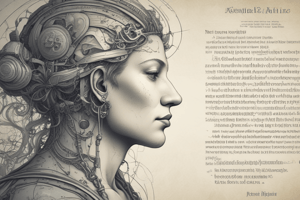Podcast
Questions and Answers
Define Bioethics.
Define Bioethics.
Ethical implications and applications of the Act done voluntarily in health-related life sciences.
What are the two basic elements of Conscience?
What are the two basic elements of Conscience?
- Moral Obligation
- Moral Judgment
- Freedom (correct)
- Knowledge (correct)
Autonomy is the right for every human being to determine what should be done to their body.
Autonomy is the right for every human being to determine what should be done to their body.
True (A)
_______ is the duty of health care workers to be of benefit to the patient.
_______ is the duty of health care workers to be of benefit to the patient.
Match the following bioethical principles with their descriptions:
Match the following bioethical principles with their descriptions:
Define a healthy person according to the provided text.
Define a healthy person according to the provided text.
What are some virtues associated with healthcare providers according to the text?
What are some virtues associated with healthcare providers according to the text?
Trust is solely a subjective judgement based on feelings.
Trust is solely a subjective judgement based on feelings.
The calling of a healthcare provider is to uphold __________ and not vices.
The calling of a healthcare provider is to uphold __________ and not vices.
Match the following terms with their descriptions:
Match the following terms with their descriptions:
Study Notes
Bioethics
- Bioethics is the study of ethical implications and applications of health-related life sciences.
- Ethics involves the identification, study, and resolution or mitigation of conflicts among competing values or goals.
- Conscience is the inner feeling or voice that guides moral judgments, and has two basic elements: moral judgment and moral obligation.
Clinical Ethics
- Clinical ethics is a practical discipline that aims to resolve ethical questions or disagreements that emerge in healthcare practices.
- Maslow's Hierarchy of Needs is a key concept in bioethics, prioritizing the good of the entire person (physical, psychological, and spiritual).
Conscience
- Types of conscience include correct or true, erroneous or false, culpable, inculpable, certain, doubtful, scrupulous, and lax.
- Conscience is essential in making moral judgments and decisions in healthcare.
Ethical Principles
- Stewardship: recognizing the responsibility to provide necessary healthcare services and promote health and life.
- The Human Act: recognizing the totality of human life, prioritizing the good of the entire person.
- Double Effect: a situation where a good effect and a bad effect occur simultaneously.
Bioethical Principles
- Autonomy: the right of adult humans to determine what is done to their bodies, basis for informed consent.
- Justice: a concept of moral rightness based on ethics, rationality, and fairness.
- Beneficence: the duty of healthcare workers to benefit patients.
- Non-maleficence: avoiding intentional harm or injury to patients.
Justice
- Types of justice include distributive, procedural, restorative, and retributive.
Patient Rights
- Patient right to information: medical diagnosis, treatment, progress, and medical records.
- Proxy consent: allowed for those who cannot give consent, with certain constraints.
Beginning of Life
- Inviolability of life: perceiving all persons as equal and of immeasurable worth.
- Crimes against human life include suicide, mutilation, and euthanasia.
Surrogacy and Artificial Insemination
- Surrogacy: carrying a pregnancy for intended parents, either related or unrelated.
- Artificial insemination: deliberate introduction of sperm into the female uterus for pregnancy.
End of Life
- Needs of a dying person: comforting, relieving suffering, and addressing physiological and spiritual needs.
- Death: a two-sided opportunity, not a punishment, according to Karl Rahner.
Healthcare Provider
- Calling of a healthcare provider: a state of complete physical, mental, and social well-being.
- Virtues vs. vices: virtues include fidelity, honesty, respect, compassion, and courage, while vices include authority, power, pride, and greed.
Profession vs. Occupation
- Profession: extensive training, autonomy, and higher education, with a focus on social justice.
- Occupation: paid work with supervision, focusing on production.
Trust
- Types of trust: subjective, action-based, objective, and reflective.
- Healthcare provider and patient relationship is based on trust, with obligations towards patients including technical competence, non-maleficence, beneficence, and confidentiality.
Studying That Suits You
Use AI to generate personalized quizzes and flashcards to suit your learning preferences.
Description
This quiz covers the ethical implications and applications of health-related life sciences, including the study and resolution of conflicts among competing values or goals.




